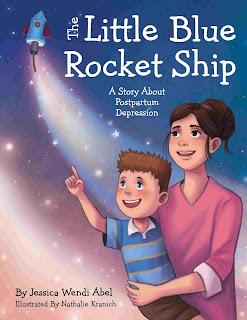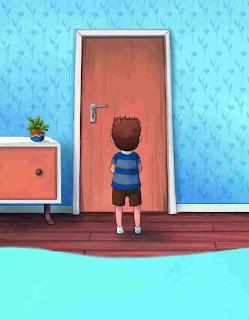The Inspiration for Writing the Book on PPD
Postpartum depression (PPD) is the most common condition of childbirth and affects up to 20% of women. PPD impacts not only the mother but the entire family structure, regardless of age, race, culture, and income level. In this article, learn about one mom’s struggle (Jessica Wendi Abel) with postpartum depression and what she did to cope with it, in her own words.

New mom dealing with Postpartum depression
Impact on Mental Health due to PPD
I lived with a combination of shame, sadness, rage, and anxiety for one year after my first son was born. As a result, I decided not to give him a sibling. There was no way I could experience that darkness again. When my oldest turned four, I changed my mind. I decided I would not allow the fear of having PPD again to stop me from expanding my family. The second time around, I did experience PPD— but to a lesser extent—because I was far more prepared.
I had no idea I was experiencing postpartum depression. I just figured I was a bad mom who wasn’t cut out to raise a family.
In the thick of my postpartum depression and anxiety, I was not able to articulate what I needed. As a speech-language pathologist, I had built my career around the ability to effectively communicate and to help others find their voice. When this was taken from me by PPD, I was deeply ashamed.
I knew that having a history of PPD increased my likelihood of getting it again, so I got myself into therapy while I was pregnant and pre-registered for postpartum support groups. Near the end of my second pregnancy, I created a postpartum plan with my husband and therapist and let my family and friends know the best ways to check in with me. This way, my support system was already in place before the baby’s arrival.
After my second baby, I knew I was experiencing postpartum depression and I was not a bad mom. I was struggling.

New moms need family support.
Inspiration for Writing Book on Postpartum Depression
There was one more thing I needed to do before giving birth to my second child: order a children’s book on postpartum depression to read with my oldest child in the event my family would be touched by postpartum depression again. My family needed a resource like this, and as a speech-language pathologist, I routinely used social stories, pictures, and books to teach concepts.
When I logged into Amazon and could not find one single book on this topic, I knew I had to write it for the one in seven families that will experience postpartum depression.
The Little Blue Rocket Ship: A Story about Postpartum Depression is a book that encourages supportive communication and helps families find their voice during a beautiful and difficult time.

Book on Postpartum Depression for New Moms
I spent one year developing my book which was based on real conversations and experiences with my own family. At the time, my oldest son loved building rocket ships, and I wanted his interests to be captured in the story. It was important for the visuals to be engaging for children and the illustrations to be of high quality.
My son helped creatively with the book development—from choosing the image on the front cover to the main character’s outfit. Even though developing the book was healing, it was daunting to complete. I needed to hire an editor, illustrator, and book designer, all while going through postpartum depression a second time.

However, I was determined to help other struggling families, and taking nearly a year of maternity leave allowed me to finally complete the book.
The Little Blue Rocket Ship: A Story About Postpartum Depression is told by a boy who sees changes in his mom after she has a baby. As the boy explores his own feelings and questions, he is reassured by his mom’s continued love for him. Blending together fiction storytelling with supportive communication strategies, The Little Blue Rocket Ship encourages open dialog about postpartum depression between family members.
In addition, I intend to share my tips with new moms and their families to experience a happier postpartum period. Below are some tips to support mothers and families dealing with PPD.
Tips for Moms experiencing Postpartum depression
Know your history.
Those with a history of depression or PPD have an increased likelihood of getting it again.
Get help before the baby comes.
Find local support groups or register for online postpartum support groups in advance of having the baby. Many of them offer free or reduced-cost support. Consider finding a therapist and scheduling sessions right before the delivery or right after.
Allow yourself grace. It’s okay to change your mind.
If the demands of breastfeeding are negatively impacting your mental health, it’s okay to switch to formula. Any way the baby eats is a great way. Don’t ever feel guilty for prioritizing your mental health as a mom.
Tips for Families Supporting a New Mom
Know her history and warning signs.
If she struggled with depression before, pay extra attention. Know the warning signs to look out for in new moms who may be experiencing PPD: intense sadness, guilt or rage, loss of interest in things she normally enjoys, difficulty making decisions, changes in sleep patterns, thoughts of self-harm or suicide. This is not an exhaustive list. Please seek out professional advice for more information.
Listen and use supportive language.
Acknowledge that pregnancy, childbirth, and the postpartum period are difficult. Validate her feelings by listening and letting her know that you want to support her. It’s okay to be honest and admit you don’t know how to do that, but that you are willing and there for her.
Offer to cook a meal or watch the baby so she can do something that brings her joy. If she is struggling with postpartum depression, she may not be able to feel joy when taking care of a baby.
Practice gratitude.
Tell her something you appreciate about her. It can be something related to how she mothers or it can be something unrelated to her identity as a mom. When a person is struggling with depression, it can be difficult to see these positive attributes within themselves.
Despite the many families that will be touched by postpartum depression, finding supportive and family-friendly resources can be incredibly difficult.
Nevertheless, don’t feel ashamed to ask for help. You are not alone and there are resources to help struggling moms and families. To learn more about Jessica Wendi Abel’s work and to purchase a copy of her book, please visit https://www.littlebluerocketship.com/order-book
